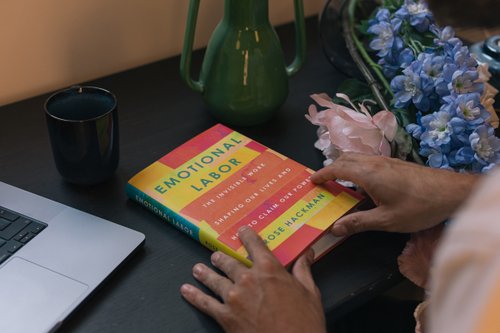Burnout: prevention is better than cure
Nov 22, 2019
4 mins


Psychologue du travail et psychologue clinicienne
Burnout, or occupational burnout syndrome, is recognised by the World Health Organisation as a phenomenon associated with work-related stress, but it is not classified as a medical condition. This disorder emerges as a result of chronic workplace stress. Stress can lead to physical and mental health problems which, in the most severe cases, can even lead to suicide. The term burnout is difficult to define due to the fact that the syndrome is triggered by a unique combination of personal characteristics and work factors.
The lack of recognition of burnout as an occupational disease is a real obstacle to its prevention and management. It is important to detect the warning signs so that you see it and, above all, stop yourself from reaching breaking point. Here we talk you through the tell-tale signs and possible courses of action so that you can act before it’s too late.
How does burnout happen?
Burnout is closely related to work stress. It is rooted in psychosocial risks factors such as:
- An excessive workload
- Struggling to make sense of your job
- A lack of autonomy and social support
- Feeling underappreciated at work
- The conflict between your personal values and those of your professional environment
- Job insecurity
When these factors are constant, over time they can cause physical, mental and/or emotional exhaustion that can lead to medical, or even psychiatric complications. It is important that companies know how to identify the signs and symptoms of burnout—and are able to put preventive measures in place for their employees.
However, the word “burnout” should be used with caution. It is sometimes used inappropriately, and is often confused with other health issues that might have similar symptoms, such as depressive disorders. It is also important to know that burnout is a reaction to long-term stress, and does not occur after short periods of intense activity. Burnout happens when we begin to feel drained having to face daily, recurring stress at work.
Many researchers have analysed burnout. Although not all of them agree on every symptom, these are the three that feature consistently:
- Mental and physical exhaustion.
- A feeling of detachment.
- A reduced sense of self-accomplishment.
The physical and mental warning signs of burnout
If we are aware of the warning signs, we can put preventative measures in place to avoid reaching a tipping point. When you read the list below, keep in mind that some signs may also be symptoms of other disorders. If you think the signs match your situation, consult a doctor—a GP or psychiatrist—or a psychologist, who can help with the diagnostic process and treatment.
Nine warning signs
- Feeling unproductive at work
You have the feeling that you are not performing as well as usual. This feeling leads to frustration and a loss of self-esteem, which reinforces the feeling that you are not living up to expectations.
- Attention and concentration disorders
You realise that you are having greater difficulty in maintaining the level of concentration required to carry out your tasks. For example, your mind goes blank, you lose your train of thought, get distracted, lose things and so on.
- Difficulty leaving work and disconnecting
If you are burdened by an excessive workload as well as having problems concentrating, trying to compensate by working overtime is a red flag. Unfortunately, the tendency to work more only heightens your exhaustion and that unproductive feeling.
Insomnia, nocturnal awakenings and worries about work prevent you from resting at night or being able to relax during your downtime—weekends, holidays and so on—which causes intense physical and mental exhaustion.
- Constant work-related concerns
It is hard for you to stop thinking about work, and this creates stress and anxiety.
- Difficulty managing emotions
You feel irritable, tend to get angry more easily and switch from laughing to crying without warning. And you don’t understand why you’re having these mood swings.
- The feeling that ‘everything hurts’
You suffer from headaches, muscle tension, backaches or viral infections more frequently.
- Eating disorders
You notice that your eating habits have changed. You tend to eat larger amounts or, on the contrary, you have very little appetite.
- Change of habits
For a while now you have noticed an increase in your consumption of tobacco, alcohol or other substances, either to compensate for the feeling of tiredness or to stop thinking about work. People around you, or you yourself, feel that you’ve become more cynical and pessimistic, with a tendency to isolate yourself, in stark contrast to your usual behaviour.
I recognise these signs in myself or a colleague. What should I do?
The symptoms described above can alert you to risks for yourself and for close colleagues or bosses. Remember that they may indicate a risk of burnout, but they could also reveal other past disorders or events, which had an impact that was previously trivialised. Here are several measures to take if you think you recognise these signs in yourself or someone else.
- Take the time for self-care
This doesn’t mean thinking only about yourself or being self-centred. It’s about showing the same kindness to yourself that you usually save for loved ones. To do this, first you must take your time to analyse what is happening internally and identify any red flags. In addition, talk to your loved ones about work-related problems and stress.
- Be aware of the sources of stress at work and look for solutions
Engage in conversations with colleagues and superiors to find ways of improving working conditions. These changes could be beneficial to everyone involved.
- Press pause
During your lunch break, avoid talking about work and, above all, do not eat at your desk. Take the opportunity to break for five to ten minutes every hour to walk, get some fresh air, listen to music, stretch … in short, take time to breathe a little.
- Disconnect
Set boundaries: decide with your boss at what times you should be contactable. Outside these hours, turn off the company mobile and forbid yourself from checking your work email.
- Invest in something other than your professional life
Work is important and can be a true source of recognition of your skills and abilities. However, if you only invest energy into your work life, this can quickly become frustrating. It is essential to reserve time for yourself—for example, take part in a creative or sporting activity—and make time for your loved ones.
- Consult a professional
If you feel that the situation is beyond your control, you must see a doctor. It may also be necessary to make an appointment with a psychologist or psychotherapist in order to understand what personal dynamics, beyond work factors, have contributed to this harmful behaviour and situation.
In the fight against burnout, companies have an important role to play in preventing and alerting their employees about these problems and related psychosocial risks. To do this, they can seek advice from companies that specialise in lowering this type of risk factor in the workplace.
Translated by Sunita Maharaj-Landaeta
Photo: Welcome to the Jungle
Follow Welcome to the Jungle on Facebook and subscribe to our newsletter to receive our best articles.

More inspiration: Mental health

‘We need each other’: Monika Jiang on combating loneliness in hybrid work
Hybrid work offers flexibility but can leave us feeling disconnected. Monika Jiang explores how we can rebuild workplace connections.
Dec 19, 2024

Struggling at work? Here are 3 steps to rebuilding your self-esteem
Low on confidence? Learn how reflection, recharging, and refocusing can help you rebuild self-esteem and thrive professionally.
Nov 27, 2024

10 ways to beat the Sunday Scaries
Even people who love their jobs can experience the Sunday Scaries. Psychologist Karen Doll offers several strategies to help manage and overcome it.
Sep 12, 2024

Unpacking the burden of emotional labor
Rose Hackman’s "Emotional Labor" reveals how managing emotions impacts everyone, especially women and minorities.
Aug 08, 2024

Is financial anxiety harming your productivity?
Feeling overwhelmed by financial anxiety? You're not alone. Discover practical steps and expert advice to regain control of your work-life balance.
Jul 31, 2024
The newsletter that does the job
Want to keep up with the latest articles? Twice a week you can receive stories, jobs, and tips in your inbox.

Looking for your next job?
Over 200,000 people have found a job with Welcome to the Jungle.
Explore jobs